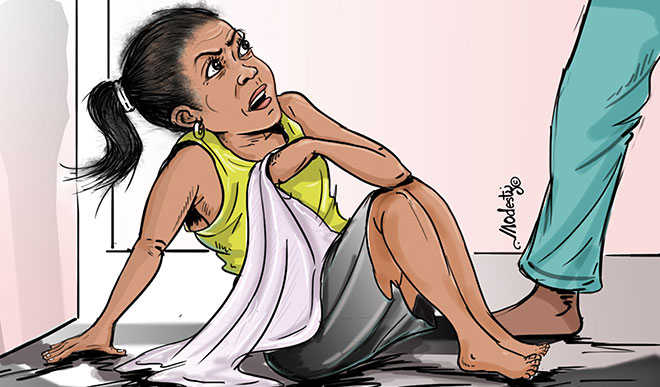
The increasing rate of reported rape cases against minors in Nigeria is becoming alarming to the extent that not even toddlers are spared.
Rape is now a recurring decimal in our society, with recent statistics leaving many wondering if there will ever be an end to the menace.
Rape is defined as sexual assault, usually involving intercourse, which is initiated by one or more persons against another person without that person’s consent.
A victim who prefers anonymity while recounting her ordeal, when she was raped by their neighbour at the age of 14 said, the rapist who was to watch over her while her parents were away massaged her after the act.
“After he defiled me, he boiled water and massaged my private part to reduce the pain. He warned me not to tell my mother or she will kill me. Knowing my mother’s strictness, I knew the best thing was to keep it to myself.”
She said her mother didn’t notice because she had five of them to worry about while her father was a retiree and could barely support them.
“That experience changed my life in so many ways. I still carry the scar of that event,” she said.
A recent investigation by an organisation involved in conducting public opinion polls within the country, NOI Polls, revealed that nearly seven in 10 adult Nigerians that is, 67 per cent have decried the high incidence of teenage rape in the country, while three in 10 that is, 31 per cent personally know of a victim of child rape in their local communities.
The findings of the opinion poll further revealed that almost four in 10, representing 36 per cent, of adult Nigerians claimed that most often the alleged offenders involved in child rape were close family members, relatives and neighbours representing 33 per cent.
Half or 49 per cent of those that personally know a victim said they were usually children aged between seven and 12 years.
Mrs. Esther Akwu, a medical professional and Head of Social Welfare Department, Kuje General Hospital, whose department handled two cases in the previous year said, rape cases brought in by the police hardly ended in the perpetuators being prosecuted.
She said her department offered some kind of emotional counselling after the patient has been attended to by the doctor and in the case of a minor, like that of a three-year-old girl raped by a 25-year-old man, they offered counselling to the parents.
“Our job is to counsel the parents in this case. This might have happened because of the carelessness of the parents. Some parents allow their children to roam anyhow in the neighbourhood thereby leaving them at the mercy of men who molest them,”she said.
Once the doctor was able to treat the patient, conduct various tests – HIV/AIDs and other infections – to determine whether the patient was negative or positive, “we handle the emotional aspect,” she said.
“As Nigerians we were taught to be free with neighbours but the world has changed. This is not the time to allow your child to go to people’s houses anyhow, because you don’t know the intention of some dubious boys and men around you,” she said.
She said rape is under reported in our society, explaining that a lot of cases were covered up thereby jeopardizing the lives of the victims.
“Keeping quiet may have a negative impact on the victim’s life forever; the person may not recover from it even in adulthood,” the social worker said.
Mrs. Akwu advised parents on the need to teach their wards tips to help them overcome advances from men. Many have attributed the increase in rape cases to the high level of moral decadence in the society.
Others however blame the recurrence on weak institutions.
Lucky Nwakanobi, a Lagos-based lawyer, said the only way to break the silence is for parents to build stronger relationship with their children. This, he said, will create trust.
“Parents have big roles to play, if the silence is to be broken. Many children do not have confidence in their parents and so, prefer to bear the pain alone,” he said.
The environment where children are raised is also something to be considered, he explained, noting that children from less privileged background are exposed more.
“At that level, they are not protected; they are left to fend for themselves, while their parents go in search of their daily bread.
“The upper scale children are usually left in the hands of nannies and guardians, they live a softer life. Children from such homes are closer to their parents so there are high tendencies that they will tell their parents, if such should happen to them,” he said.
Nwakanobi stated further that the slow road to justice also contributes to the silence of rape victims.
“Rape is an offence, and in every criminal case, evidence is needed with reasonable doubt. We live in a society where getting evidence is not so easy sometimes; victims don’t want to talk for fear of retribution or punishment. The person raped does not want to be stigmatised so, she is not eager to report or follow up the case,”he said.
He added that delay and corruption in the Nigerian judicial system may also frustrate the victim.
The way forward, he said, is advocacy and sex education that should be given to children starting from primary school.
“They must know that rape is a crime and when it happens it should be reported and more importantly justice should be served, because the only way rape victims can be compensated is for justice to be served,” he said.
The prevalence of rape in Nigeria is a clear evidence that our morals have been eroded, said Alhaji Alhassan Abubakar Bichi, president of Association of Medical Social Workers of Nigeria (AMSON), adding that any society where values are eroded, social vices tend to be on the increase, of which rape is one.
According to Alhaji Alhassan, the society has not lived up to its responsibility, which is why rape victims do not come forward with their complaint.
This, he said, is a challenge for many social workers.
“Many victims don’t report when they are raped because they are afraid of being criticized and stigmatised by society,”he said.
In some communities, he said it is a taboo for anyone to marry a rape victim.
“The society forgets that these women are victims and should get love and care but this is usually not the case,” he said.
Though most believe that the bulk of the responsibility is shouldered by parents, to monitor and protect their children, Alhaji Alhassan strongly believes that religious institutions have a role to play in reducing rape cases.
“The pastors and imams must start talking about sex in churches and mosques if this issue is to be addressed,”he said.
Dele Omojuyigbe (Phd), a lecturer at the Nigerian Institute of Journalism (NIJ), Lagos, noted that, frustration emanating from lack of self-worth can cause rape.
“Unemployment brings frustration, so also does injustice, despair, poverty and others,” he said.

 Join Daily Trust WhatsApp Community For Quick Access To News and Happenings Around You.
Join Daily Trust WhatsApp Community For Quick Access To News and Happenings Around You.


